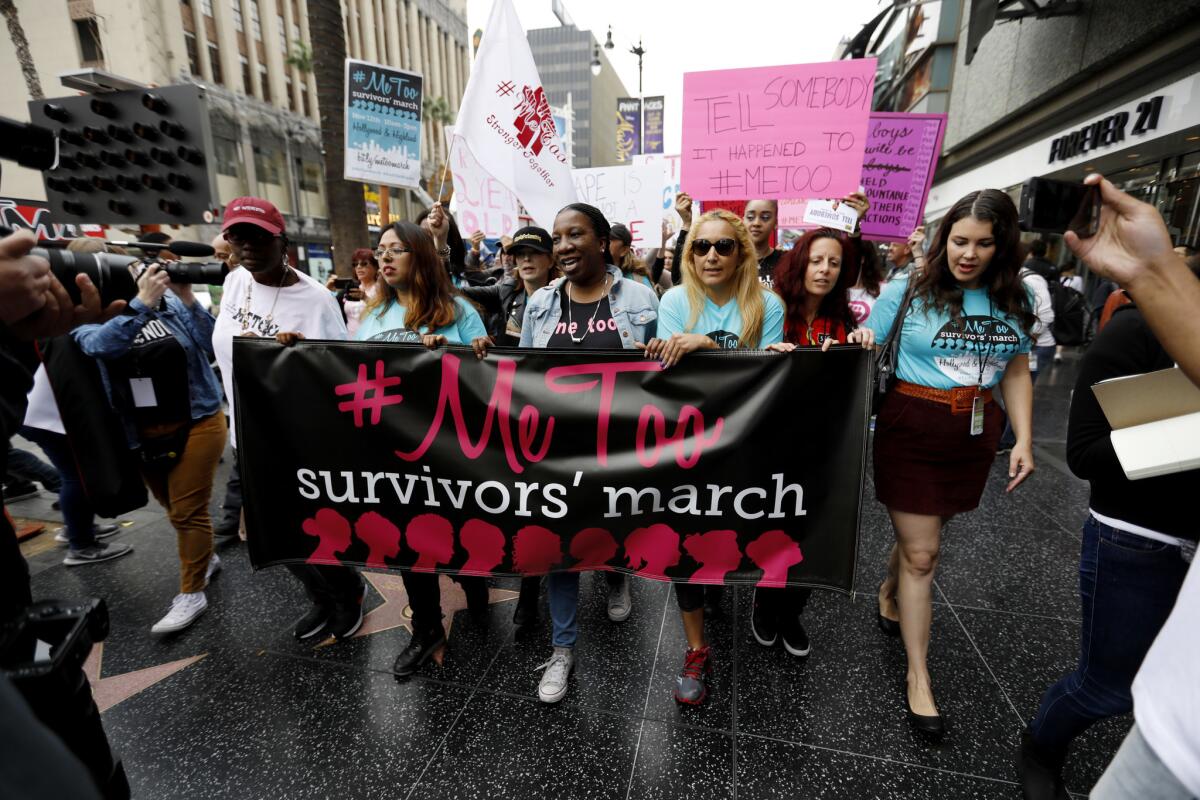California’s workplace sexual harassment laws strengthened

- Share via
SACRAMENTO — Gov. Gavin Newsom took action Thursday to strengthen California’s workplace protection laws related to sexual harassment, signing bills that were vetoed by his predecessor last year.
The new laws will give victims of sexual harassment more time to file complaints in California and ban forced arbitration as a condition of employment. After former Gov. Jerry Brown vetoed several bills inspired by the #MeToo movement in 2018, authors of the legislation took another shot this year with the hope that Newsom might be more sympathetic.
“For many, a job can provide a sense of purpose and belonging — the satisfaction of knowing your labor provides value to the world,” Newsom said. “Everyone should have the ability to feel that pride in what they do, but for too many workers, they aren’t provided the dignity, respect or safety they deserve. These laws will help change that.”
Newsom signed Assembly Bill 9 by Assemblywoman Eloise Reyes (D-Grand Terrace), which will extend the window to file complaints with the Department of Fair Employment and Housing from one to three years for victims of workplace harassment, discrimination and civil rights-related retaliation. California law requires employees to submit complaints to the state before they can file a civil lawsuit. Once an employee receives a right to sue notice from DFEH, they are given an additional year to file the lawsuit.
Proponents of the legislation, which include employment and consumer attorneys, say most people are unaware of the one-year window, which begins at the time the harassment occurred, and the new law will provide them more time to weigh their options. Supporters also argue that the law aligns the time limits to file sexual harassment complaints with filing deadlines for other types of actions.
In his veto message last year, Brown echoed concerns from the California Chamber of Commerce that the bill would drag out the process to resolve issues in the workplace.
“We’re setting a standard,” said Jacquie Serna, legislative counsel for the Consumer Attorneys of California. “We’re setting an example for others who want to make robust labor laws meaningful and accessible to all workers.”
Another new law that had previously failed to clear Brown’s desk last year aims to end forced arbitration, in which employers require workers to waive their right to a trial over any future labor disputes as a condition of employment. Brown rejected a similar proposal, AB 3080 by Assemblywoman Lorena Gonzalez (D-San Diego), in 2018.
Gonzalez, who brought the bill back this year, lauded Newsom’s decision.
“When both parties choose arbitration freely, it can be a highly effective tool. But it doesn’t work when corporations say you won’t be hired unless you sign away your rights,” Gonzalez said. “This law will protect workers when employers allow discrimination, permit sexual harassment, or engage in wage theft.”
A common employment practice, arbitration agreements can limit the ability of an employee to sue an employer before the sexual harassment occurs. Workers who sign an arbitration agreement can experience difficulty finding an attorney to represent them. In addition, the results of arbitration are typically confidential, which can allow the perpetrator to continue to harass others in the workplace.
The California Chamber of Commerce included the bill on its “job killer” list — legislation that it says will deter business in California and that the organization’s lobbyists aim to block from becoming law. The chamber said the bill is probably preempted by the Federal Arbitration Act and would increase employment litigation and costs for companies.
More to Read
Sign up for Essential California
The most important California stories and recommendations in your inbox every morning.
You may occasionally receive promotional content from the Los Angeles Times.














